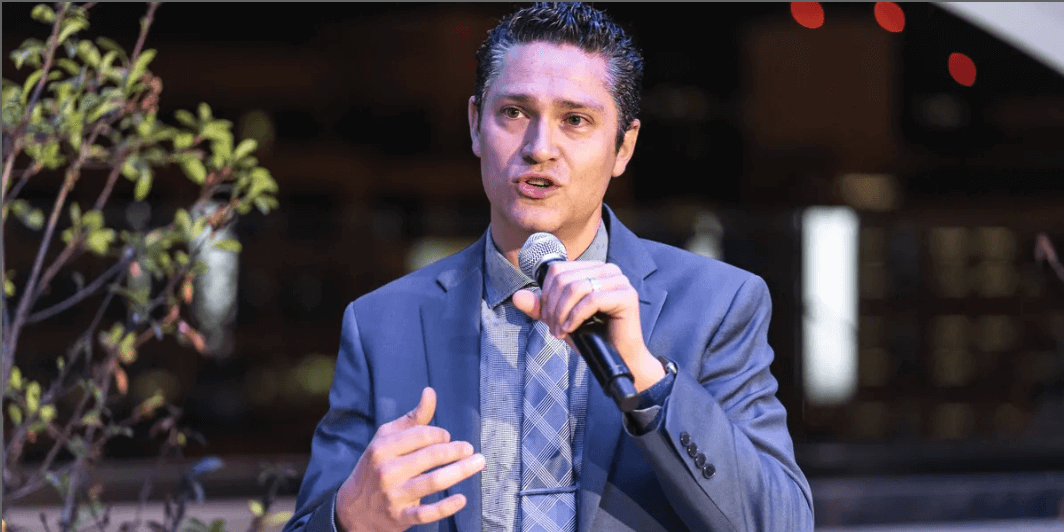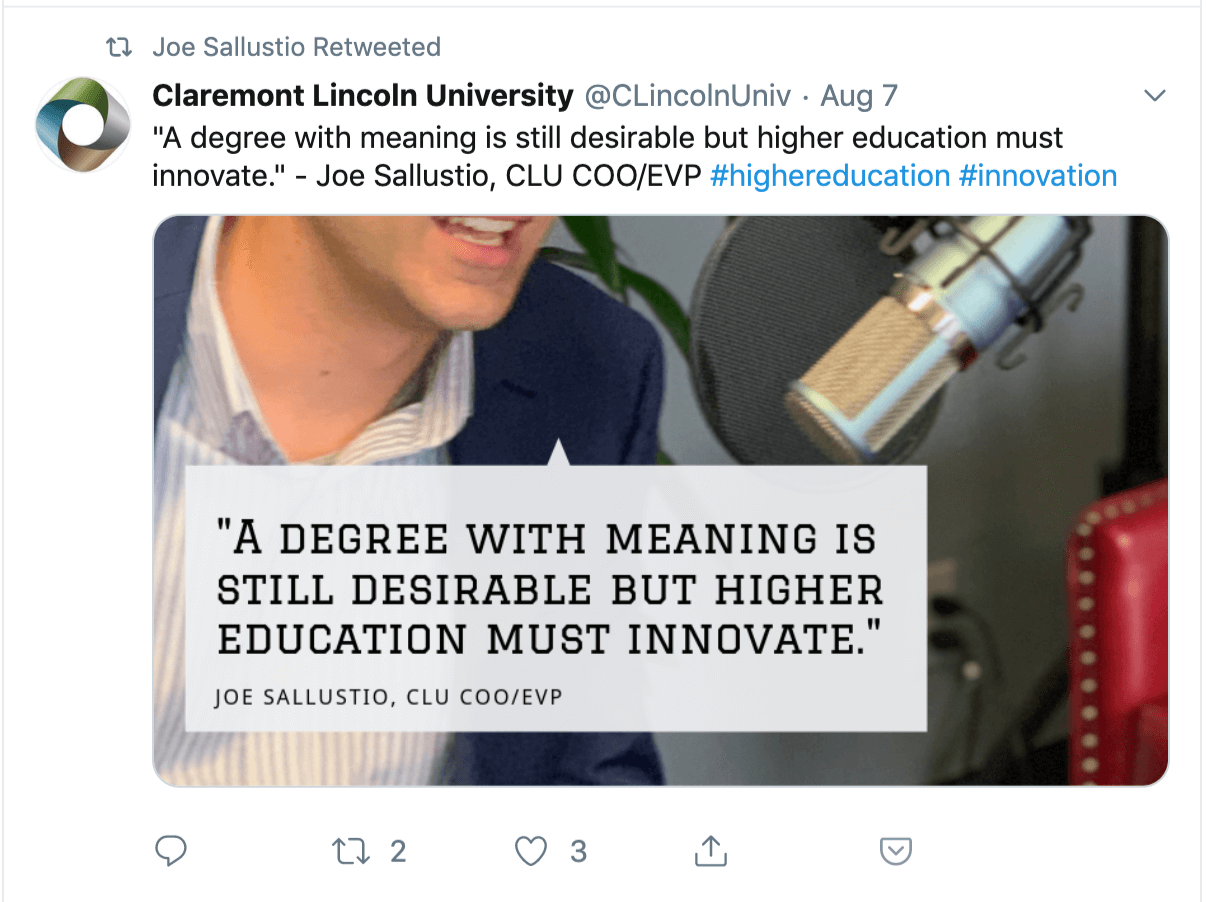“Will Stanford need to change to survive?” Who is exempt from completely overhauling their edu system. How colleges are morphing into a totally technological experience — including getting a degree just from your smartphone. Plus, the biggest challenges for Claremont Lincoln University’s COO and EVP, Joe Sallustio. We continue our in-depth interview this week. Catch up on part 1

Exclusive Insider Interview: CO and Executive VP, Claremont Lincoln University & Host of Admissions Live Podcast
SocratesPost: I saw your retweet from Claremont Lincoln’s Twitter page. It was a quote that you said at one point. “A degree with meaning is still desirable, but higher education must innovate.” What does that mean?

Joe at CLU: Here’s what I think it means: The way people learn is not just going to a university anymore. There are certificate programs, there are boot camps, coding camps, there are businesses or large organizations investing in their own training apprenticeships, Amazon is a recent example. And I don’t remember the exact number of millions off the top of my head, but I think it was $77 million invested in training their employees for the jobs that Amazon is going to require them to do. It had nothing to do with higher education. So, there’s a much more competitive environment: it’s not just an online university competing for a student against an online university or another on ground university. There are other competitive factors.
The way people learn is not just going to a university anymore.
SocratesPost: What are other businesses that universities are competing with?
Joe at CLU: There’s Coursera or Udacity, where you can go and learn a skill quickly. You want to learn something about human trafficking? You can take a course on Udacity for $19.95. Do you really need to go take an anti-human trafficking course at university? Learning has become more mobile, more accessible. And so, it’s becoming non-traditional, in a sense. Online education is a great example of how higher ed is changing. Some of the universities across the country that have experienced closures, didn’t have online programs.
SocratesPost: What’s an example of universities closing because they weren’t innovating?
Joe at CLU: I saw an article recently that said that the SUNY system where I went to school is really ramping up their online program for the undergraduates to make accessibility greater. And if you think about what that competition looks like, here’s what it means to me. Let’s say I’m a small school in a small state, and my entire hundred-year history has been recruiting students from within my small community for my small school in my small state. Now, I’ve got 100 universities with online programs recruiting my students from my small community in my small state, putting ads up on social media for those students, and maybe that student who would have come to my university and taken on ground classes is now taking online classes with the University in Texas. So just by itself, the accessibility of online education means higher ed must change. Schools that don’t offer online programs are moving very quickly to offer online programs so that they can capture that percentage of the population that they may be otherwise losing. Add to that organizations that are not requiring higher education for employment, like Google.
SocratesPost: Big employers are relying less and less on traditional higher education qualifications to recruit qualified workers. What are your thoughts on that?
Joe at CLU: Google put out a huge narrative about how they will no longer require a bachelor’s degree to hire people for jobs. They’re not looking at education with the same reverence as they once did. Then you add to that coding boot camps, the short-term learning opportunities, or other institutes that are entering the space and you have not only a competitive university landscape, but you have a competitive alternative education landscape. So how does higher education change to survive? That’s what I mean by that quote, higher ed must change to survive. Will Stanford need to change to survive? I don’t know. I don’t know what their endowment looks like, but I’m sure it’s considerable. So, maybe they don’t need to change, there may always be elite institutions that are accepting a group of students that are looking for that experience.
SocratesPost: If the elite universities don’t need to innovate to survive, who will need to innovate, then?
Joe at CLU: When you look at middle class America, it’s a different story. My mother and I were talking about this last night, and she said, “If online learning had been this accessible, we never may have sent you kids off to college. We would have looked at sending you guys to work and giving you an online education so that maybe you would have been more responsible with your college experience.” I would have taken on less debt, that’s for sure. Can families handle $200,000-$300,000 worth of debt to send their kid to an elite institution these days? Or will they look at lower cost, high quality alternatives, and will higher ed change to meet those alternatives?
SocratesPost: What other forms of innovation do you think higher ed can take, in addition to going online?
Joe at CLU: I think that technological accessibility is one way. I get a report that tells me how often I’m on my phone every week. Eventually, someone’s going to say, I’m on my phone more than I’m doing anything else. And if I’m going to go to school, I want to do it on my phone. Does that include podcast lectures and some kind of phone app activity that allows you to show your learning outcome? Podcasts are almost like online lectures in a lot of ways. We’re subscribing to online lectures when we listen to podcasts in some field that we’re interested in. Could this be an easy access to school? You’ve got a half hour commute from your house into Los Angeles, hypothetically, so every day for an hour, you work on university lecture podcasts and then run an activity on your phone. So, I think that level of accessibility is important when we look at teenagers today that are going to be entering college soon. I’ve got a neighbor who I can’t get to look up from her phone. She’s 16 years old and not only can she be on her phone, but she can be watching TV, be on her phone, and be having a physical conversation at the same time. I wonder how she pays attention to the TV? How is she texting on her phone while she’s listening to somebody talk? It seems impossible to do that. These kids are screen savvy. So, when I look at higher ed and how higher ed can innovate, I ask if we are meeting the student where they are, are we meeting the student with how the student wants to learn?
SocratesPost: Are there any colleges and universities who are innovating in those technological ways now? Where are they?
Putting a 22-year-old young adult in a significant amount of debt that they have no hope of paying off over the next 10 or 15 years and immediately putting them behind in life doesn’t make sense… It’s our social responsibility to create a better path for our students to survive.
SocratesPost: What do you typically say to critics who still aren’t convinced that higher ed needs to innovate in those ways?
SocratesPost: Okay, so it sounds like what you’re saying is that more than ever before, students can customize their learning, their timeframe, and their style of learning. Previously, there was just one type of higher ed: you take it or leave it.
SocratesPost: How do you know that you’ve succeeded with your students? How do you track student success beyond their graduation rate?
SocratesPost: It seems like your students, of course, are used to interacting with the university online. So, if they see a survey link in their email that’s not foreign to them, is that right?
SocratesPost: That’s a hidden benefit of having an online community like that. When you want to learn about them, you can easily get this information without meetings and interviews.
SocratesPost: Thinking back to your education, what aspect of yours has helped you the most in your career so far?
SocratesPost: Did you work when you were in undergrad?
SocratesPost: True that you have way more priorities at that level. So, when you’re sitting down at your desk every day, what do you think is the biggest challenge in your job?
SocratesPost: Last question, Joe. What’s your approach to resonating with your students?
SocratesPost: That’s great. Thank you so much for your time and insights.
